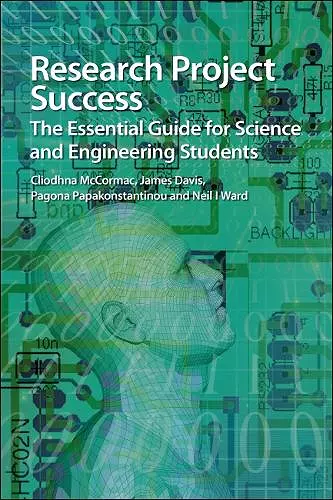Research Project Success
The Essential Guide for Science and Engineering Students
James Davis author Cliodhna McCormac author Pagona Papakonstantinou author Neil I Ward author
Format:Paperback
Publisher:Royal Society of Chemistry
Published:14th Sep '12
Should be back in stock very soon

1. A concise, multilevel resource that provides guidance on the core components common to almost every project within the physical, engineering and life sciences 2. Covers problem assessment and contextualisation, literature review practices, sources and citation, data presentation, reporting styles, data analysis and error 3. Includes case studies, examples of good practice and, in keeping with the toolbox approach, can be readily adapted and applied by the students
A concise, multilevel book providing guidance on the core components common to most projects within the physical, engineering and life sciences
The undergraduate research project is almost universally treated as the culmination of all previous lecture, lab and tutorial work. The project allows for the development of individuality and confers ownership of a challenge possessing an originality that goes far beyond the communal legacy presented by age old lab scenarios. Central to this is the magical transition of the student from a consumer of knowledge to a producer, yet the journey is often both daunting and perplexing when considering where to start and how to reach the destination using the resources provided and in the allotted time. There are numerous books within the social sciences which provide students with guidance on how to conduct a "successful" project but few can be found in relation to the physical sciences. This can be ascribed to the fact that the former has a very similar structure and procedural methodology whereas the latter can possess a near fractal differentiation into a myriad of sub disciplines and specialisms thereby preventing the provision of a single, expansive catchall text. This book adapts some of the components and ethos of the Projects in Controlled Environments (PRinCE2) project management approach to physical science projects. This is the industry and government standard and was introduced to address the common causes of project failure ie. not delivering projects on time, within budget, within scope or to the right quality. It has rapidly emerged as an international standard and most graduates will doubtless encounter it upon moving outside academia and into the wider world. It is a concise, multilevel resource that provides guidance on the core components common to almost every project within the physical, engineering and life sciences (problem assessment and contextualisation, literature review practices, sources and citation, data presentation, reporting styles, data analysis and error etc). It standardises the delivery of the material but, more importantly, links the components together by outlining a coherent procedural road map that can highlight to the student "what to do", "when to do it" and "how to solve it" procedures. The content of the book is presented through case studies so as to enhance the relevance of the processes,...
"primarily aimed at undergraduates" "much of the advice applies equally well...to those embarking on a PhD." "The authors give a lot of the useful advice for selecting a project, reviewing the literature, referencing, writing the dissertation and giving presentations." "easily read and digested" "First time research students, and even final year PhD students, would do well to read this book to understand the standards expected for a dissertation."
* Chemistry World, July 2013, Volume 10, NumberISBN: 9781849733823
Dimensions: unknown
Weight: 222g
152 pages